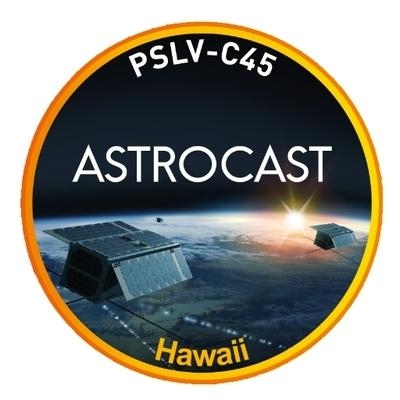Thu, Apr 04, 2019
Satellite Tests Clean Propulsion Technologies For Rapid Separation, Collision Avoidance, And De-Orbiting
Astrocast has successfully launched its second IoT Nanosatellite. The launch, piloted by Indian Space Research Organization (ISRO) on its Polar Satellite Launch Vehicle (PSLV), took place yesterday from the Satish Dhawan Space Center. This second mission will offer more opportunities to customers interested in testing the Astrocast IoT communication services. This mission will also focus on a set of propulsion technologies designed for separation, collision avoidance and de-orbiting.

“It is very important that companies think about the entire lifecycle of their nanosatellites. As a Swiss company, we will lead by example and do everything we can to keep space clean. Using a set of reliable and flight proven technologies, Astrocast is building the ability to control, maneuver and ultimately de-orbit its satellites,” said Fabien Jordan, CEO of Astrocast. “We can avoid collisions from other satellites, easily de-orbit and re-deploy satellites for technology upgrades, and reduce the amount of space debris left at the end of a satellite’s lifecycle. This nanosatellite represents the first of many technology advances we aim to develop toward the security and longevity of our network.”
The ability to control, reposition and de-orbit nanosatellites is key to lessening the amount of space debris that is currently plaguing low-earth orbit missions. Collision avoidance is an ongoing battle. Astrocast is the first to test a series of technologies that will allow them to have greater control and maneuverability of their network once it is launched. These technologies include:
- Gas propulsion
- Electric propulsion
- Automatic de-orbiting
- Backup communications
“It is important that companies begin to think long term about the nanosatellites they launch into orbit. Clean nanosatellite technology is possible, and we are taking some of the first steps toward this,” Jordan said.
This is the second test of the Astrocast IoT Nanosatellite network. The first test, launched in December, is fully stabilized with a working payload and is operating nominally. Astrocast is a nanosatellite network of 64 CubeSats specifically designed to transmit and receive low bandwidth data from IoT devices. Astrocast will be the first nanosatellite solution to deliver all of these features:
- 100% coverage of the globe including remote areas
- Lowest latency low earth orbit network
- Two-way communications
- L-Band and S-Band frequencies
- Communication module smaller than a credit card designed in partnership with Airbus
- 256 bit encryption with multi-level security
- Patented data protocol developed and optimized for satellite IoT
- Low-cost and ultra-low power chipset optimized for Astrocast
- Miniaturized antenna
- Low-cost data plans
- Web application for monitoring assets and subscription plan.
(Source: Astrocast news release)
More News
Aero Linx: Model Aeronautical Association of Australia MAAA clubs are about fun flying, camaraderie and community. For over 75 years, the MAAA has been Australia’s largest fl>[...]
Touchdown Zone Lighting Two rows of transverse light bars located symmetrically about the runway centerline normally at 100 foot intervals. The basic system extends 3,000 feet alon>[...]
“Discovery and innovation are central to our mission at Virgin Galactic. We’re excited to build on our successful record of facilitating scientific experiments in subor>[...]
How To Get A Story On Aero-TV News/Feature Programming How do I submit a story idea or lead to Aero-TV? If you would like to submit a story idea or lead, please contact Jim Campbel>[...]
Student Pilot Reported That During Rotation, “All Of A Sudden The Back Of The Plane Kicked To The Right..." Analysis: The student pilot reported that during rotation, “>[...]
 ANN's Daily Aero-Linx (05.02.24)
ANN's Daily Aero-Linx (05.02.24) ANN's Daily Aero-Term (05.02.24): Touchdown Zone Lighting
ANN's Daily Aero-Term (05.02.24): Touchdown Zone Lighting Aero-News: Quote of the Day (05.02.24)
Aero-News: Quote of the Day (05.02.24) ANN FAQ: Contributing To Aero-TV
ANN FAQ: Contributing To Aero-TV NTSB Final Report: Cirrus Design Corp SR20
NTSB Final Report: Cirrus Design Corp SR20



